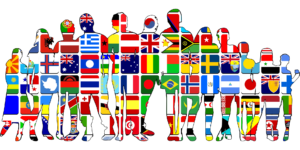I bambini si confondono quando sentono due lingue diverse parlate intorno a loro?
La risposta è no. I bambini sono incredibilmente sensibili ai modi diversi di parlare. Anche quando sentono una sola lingua, apprendono rapidamente le differenze tra il modo in cui parlano gli uomini e le donne, la differenza tra conversazioni educate, scortesi e così via. Per i bambini, una seconda lingua è solo un’altra differenza tra le persone!
Diversi anni, fa gli educatori in tutto il Nord America, hanno ribadito ai genitori immigrati che era meglio per l’istruzione dei loro figli se avessero parlato inglese a casa. Alcuni ricercatori hanno pensato che l’esposizione precoce a due lingue avrebbe messo i bambini in svantaggio. Oggi la ricerca ci dice che questo non è vero e che ci possono essere vantaggi nell’essere bilingue, come il pensiero più flessibile. Gli svantaggi che le ricerche precedenti avevano trovato erano generalmente svantaggi economici, legati alla vita degli immigrati.
Lo sviluppo bilingue produce talvolta risultati di sviluppo leggermente più lenti rispetto a quelli dei bambini monolingue.
I bambini bilingue hanno mai mescolato le loro lingue?
Come gli adulti bilingue, i bambini bilingue utilizzano spesso parole di una lingua quando parlano l’altra, ma ciò non significa che sono confusi su quale lingua stanno parlando. In una casa bilingue italiano-inglese, quando una famiglia è seduta a cena, è possibile che tante parole siano in italiano anche quando si parla inglese. Per esempio, pollo invece di chicken, sugo invece di sauce (per fortuna la pasta è pasta …). Tuttavia, nel parlare ai monolingue, i bambini bilingue sono attenti a utilizzare solo la lingua pertinente.
Come facciamo ad insegnare ai bambini due lingue?
La cosa principale da tenere a mente è che i genitori non “insegnano” ai bambini a parlare, come non insegnano a camminare o sorridere. Le cose più importanti nello sviluppo della lingua sono l’esposizione e la necessità. Se i bambini sono esposti ad una lingua in molteplici circostanze, con molte persone diverse dal momento in cui sono nati e se sentono che hanno bisogno della lingua per interagire con il mondo che li circonda, la impareranno. Se sono esposti a due lingue in circostanze diverse con persone diverse dal momento in cui sono nati e se hanno bisogno di entrambe le lingue per comunicare con le persone che li circondano, impareranno entrambe.
Sarebbe meglio iniziare ad insegnare la seconda lingua dopo che i bambini hanno un buon inizio nella prima?
Assolutamente no, soprattutto nella situazione bilingue dove la seconda lingua probabilmente sembra “meno importante” per i bambini comunque. Introducendo la seconda lingua in seguito è solo per farli pensare che sia meno importante e che non vale la pena.
D’altro canto, nella situazione di impostazione bilingue, non vi è alcun danno nel lasciare che l’esposizione dei bambini all’inglese o a qualsiasi altro linguaggio inizia naturalmente e gradualmente. In realtà, il problema più comune con la situazione bilingue di impostazione è che i bambini a volte rifiutano la lingua di casa a favore della lingua esterna.
Quello che la maggior parte delle persone non sa è che non solo i bambini sono veramente bravi a imparare le lingue, ma hanno anche competenze che li aiutano a imparare da persone non native. Per una cosa, imparano molto velocemente chi sono i buoni esempi di lingua: possono capire se una persona è fluente o meno.
La cosa principale di cui i bambini hanno bisogno non è tanto un modello di ruolo linguistico altamente accurato, ma piuttosto diverse persone che lo parlano, e un modo forte per farlo è che il genitore non parlante madrelingua possa parlare anche la lingua.
Le lingue sono diventate una parte essenziale della nostra vita e della vita dei nostri figli. Purtroppo conoscere una sola lingua non basta più. Non è mai troppo tardi per imparare una seconda lingua e non è mai troppo presto parlare con il tuo bambino nella tua lingua madre o nella lingua che si vuole far conoscere, lo consiglio vivamente.
Do children get confused when they hear two different languages spoken around them?
The answer is no. Children are incredibly sensitive to the different ways people speak. Even when they only hear one language, they learn very quickly about differences between the way men and women talk, the difference between polite and impolite ways of talking, and so on. For children, a second language is just a matter of another difference between people!
Many years ago educators throughout North America used to tell immigrant parents that it was better for their children’s schooling if they spoke English at home. Some researchers thought that early exposure to two languages put children at a disadvantage. Today research tells us that this is not true, and there may be advantages to being bilingual, such as more flexible thinking. The disadvantages that earlier research found were generally economic disadvantages, linked to the immigrants’ lives.
Bilingual development sometimes results in slightly slower language development than for some monolingual children.
Do bilingual children ever mix up their languages?
Like adult bilinguals, bilingual children often use words from one language when speaking the other, but this doesn’t mean they are confused about which language they are speaking. In an Italian-English bilingual home, when a family is sitting down to dinner, it’s possible that a lot of the food vocabulary is Italian, and this is used even when speaking English. For example, pollo instead of chicken, sugo instead of sauce (luckily pasta is pasta…). Yet in speaking to monolinguals, bilingual children are careful to use only the relevant language.
So how do we start teaching children two languages?
The main thing to keep in mind is that parents don’t really “teach” children to speak, any more than they teach them to walk or smile. The most important things in language development are exposure and need. If children are exposed to a language in a number of circumstances with many different people from the time they are born, and if they feel they need the language to interact with the world around them, they will learn it. If they are exposed to two languages in varied circumstances with different people from the moment they are born, and if they need both languages to communicate with the people around them, they will learn both.
Would it be better to start teaching the second language after children have a good start on the first?
Absolutely not, especially in the bilingual home situation where the second language is likely to seem “less important” to the children anyway. Introducing the second language later is just about guaranteed to make them think it’s less important and not worth the effort.
On the other hand, in the bilingual setting situation, there isn’t any harm in letting children’s exposure to English or any other language begin naturally and gradually. Actually, the more common problem with the bilingual setting situation is that the children sometimes reject their home language in favor of the outside language.
What most people don’t know is that not only are kids really good at learning languages, but they also have skills that help them learn from non-native speakers. For one thing, they learn very quickly who are good language role models: They can tell whether you’re a reliable speaker or not.
The main thing children need is not so much a highly accurate linguistic role model, but rather several people to speak it with, and one strong way to do that is for the non-native speaker parent to speak the language too.
Languages have become an essential part of our lives and of the lives of our children. Unfortunately knowing only one language is just not enough anymore. It’s never too late to learn a second language and it’s never to early to speak to your child in your native language, I would highly recommend it.



